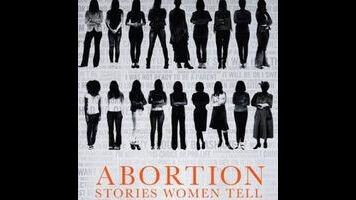A moving new doc explores abortion through the Stories Women Tell

Advocates against abortion in the United States have so far been unsuccessful at overturning the landmark Supreme Court case Roe v. Wade, and re-criminalizing the procedure nationwide. But over the past decade especially, the pro-life movement has made significant progress at the state level, by adding waiting periods and restrictions that have simultaneously reduced the number of clinics and have made it increasingly difficult for patients to get treated. More importantly, protestors and politicians have largely controlled the conversation surrounding abortion, making it so that even after women weigh their decision carefully and jump through all the regulatory hoops, they’re made to feel ashamed. The result is that those who’ve made the choice are less willing to talk about it openly—which in turn has led to those who are following in their footsteps feeling isolated and embarrassed.
Tracy Droz Tragos’ documentary Abortion: Stories Women Tell gives women who’ve had abortions the opportunity to share both their reasons and their experiences. The range of circumstances is varied. Some are single mothers who can’t afford to stop working and raise another baby. Some have medical problems that make pregnancy an intolerable burden, or are dealing with a father-to-be who’s a total louse. One well-to-do Christian couple received the news from their doctor that their child’s skull hadn’t developed and would be born dead, and so they got permission from their pastor to abort. In nearly every case, the women speak to Tragos’ camera with a mix of confidence and annoyance. They’re mad at themselves for missing a birth control pill, or for whatever else may have brought them to this point. But they don’t doubt that they’re doing what’s right.
Stories Women Tell also includes women who opted for adoption, or who’ve kept their children despite difficult situations. More than a few of the film’s interviewees—mothers or not—are active in the pro-life movement, and speak calmly but forcefully about why they believe abortion is wrong. The documentary’s diversity of voices is crucial, because Tragos’ emphasis is on listening, not judging. Aside from one tense scene—where a young pro-lifer is challenged on her anti-Planned Parenthood paraphernalia by a righteously angry pro-choice classmate—Stories Women Tell generally doesn’t try to pit people against each other, or to tear anyone down.
The problem with this approach is that the documentary can come off a little scattered. There’s not much of a structure to Stories Women Tell. Tragos follows a few stories throughout the film, but many of the women she interviews are only on screen for a few minutes, or even a few seconds. The effect might’ve been collage-like, were it not for the recurring threads, and if the movie weren’t also trying to make a specific point about the state of abortion law in Missouri. By covering too much ground, Tragos shortchanges some of her material—in particular the differences between Missouri, where anti-abortion billboards flank the interstate, and the more liberal big cities where clinics are more plentiful and accepted. (The recent documentary Trapped, while less effective overall, covers the legal side of the controversy much better.)
Still, Stories Women Tell does succeed at what it primarily means to do, which is to take abortion out of the realm of the theoretical and make it more personal. Pro or con, what unites the women Tragos talks to is their certainty. One prominent pro-life spokesperson admits that she had three abortions before she changed her mind on the issue, and that no one could ever convince her now that women who’ve had the procedure aren’t permanently “broken.” Another talks about the wonderful children and career that she’s had because she had an abortion when she was a young, penniless college student. They both get to state their case—not as rhetoric, but as narrative.